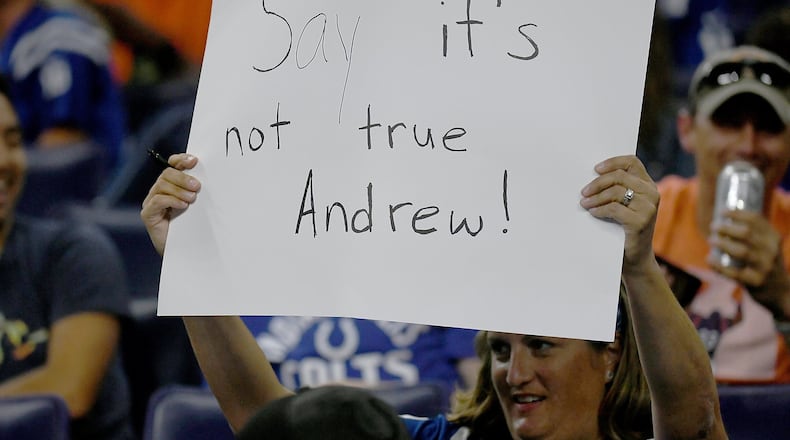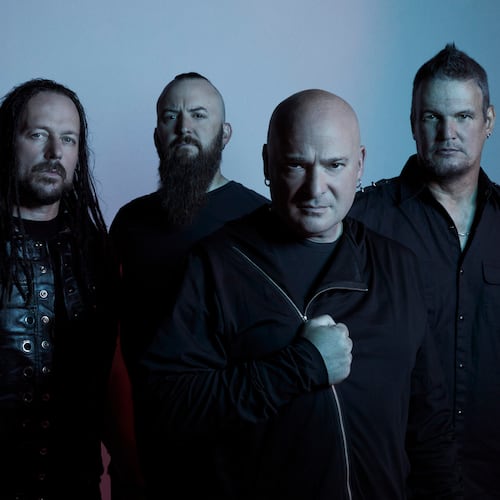Colts quarterback Andrew Luck made the hard decision to end his NFL career because of what he called “a four-year injury cycle,” and what do fans do?
They boo him.
One fan, still in the stands at his last game against the Chicago Bears on Aug. 24, removed his No. 12 jersey.
It didn’t matter — or maybe it did — that Luck had won 53 regular season games and four playoff games. It didn’t matter that he’d suffered a lacerated kidney. It didn’t matter that he had a partially torn abdominal muscle. It didn’t even matter that he’d suffered a concussion and a shoulder injury that sidelined him for all of the 2017 season.
Yeah, he fought his way back the next year, but a nagging calf/ankle injury kept him from playing.
Luck chose quality of life over the mighty dollar, and what do fans do? They boo and all I can muster is a head shake, my go-to response to crazy.
Heck, I’m still shaking my head.
What was more stunning than the boos was any mention that he was walking away from hundreds of millions of dollars like that should matter.
What is wrong with us?
RELATED | Do white NFL fans see players as human or as mascots?
Who among us wouldn’t grab a life preserver thrown to us if we were drowning? Which of you, given the chance, wouldn’t run from a burning building? Is your lust for money more important even than being fully available to your wife and children?
It reminded me of an email exchange I had last year with Erin C. Tarver, an associate professor of philosophy at Oxford College of Emory University, about fans’ reaction to Colin Kaepernick’s decision to take a knee during the playing of the national anthem to protest racial injustice.
Tarver, a lifelong sports fan and author of “The I in Team,” which analyzes sports fans and identity, said then that fans don’t see players as human beings but rather team mascots.
Boy, was she right.
Credit: The Atlanta Journal-Constitution
Credit: The Atlanta Journal-Constitution
What did she make of the reaction to Luck?
It was terrible, Tarver said, but unfortunately not too surprising.
“Many fans come to identify so strongly with their teams that they cease to think of the players as individual people at all,” she said. “If they do, it’s as people who owe them something: wins, more years of their lives, a willingness to subject themselves to serious long-term damage for the sake of the fans’ hometown.”
Football in particular thrives on this idea of personal physical sacrifice, and glorifies it as demonstrating loyalty or masculinity and connecting these with our preexisting ideas of patriotism and militarism, Tarver said.
“But what we are talking about here isn’t national defense.” she said. “It’s a game. It’s a business. It’s entertainment. It has also, of course, become much more than that to many fans.”
Still, Tarver said that fans should ask themselves whether they want to be the kind of people who feel entitled to bodily harm for the sake of something that’s ultimately trivial, and how they would feel if they or someone they loved was in Luck’s position.
RELATED | NFL unity trumps President’s hate speech
Hearing fans boo as he walked off the field following a preseason game at Lucas Oil Stadium, Luck said, hurt.
Colin Kaepernick should be so lucky. He’s been blackballed by the NFL and hasn’t played professional football in three years. He’s 31 and it’s already clear the Colts aren’t interested.
I digress because that’s important to note.
But here’s the real reason why I couldn’t let this moment pass. After the boos had died out, nearly every story I read afterward began with a mention of the money Luck was willing to give up.
I couldn’t help thinking what the reaction said about the state of our moral compass.
Edward Queen, a faculty member at the Emory University Center for Ethics and longtime University of Alabama fan and Green Bay Packers fan, called the responses completely inappropriate and wrong.
Not only was there complete disregard for Luck’s physical health, there was an implicit view that he “had no right to make his own choice about employment and this perception that somehow he had enslaved himself to the team and to the fans.”
That anyone would criticize someone who decided that his job no longer was something he could in good conscience continue was puzzling, Queen said.
“I will argue that it says something morally disturbing if not appalling on three levels. First, it shows a total and complete disregard for another human being’s physical and mental health. Second, it suggests that a longstanding metaphor that football players as gladiators has ceased to be a metaphor and has become a fact in many people’s perception and there’s this expectation that they should risk their physical and mental well-being for our amusement. And finally, it also to my mind reflects the gross decline in the acceptance of good sportsmanship as a value, reflected in the attitude that winning is everything regardless of the cost.”
The fans may not know that, but something tells me Andrew Luck has it figured out.
This past Sunday, he took out a full-page ad in the Indianapolis Star thanking “Colts Nation” fans for their support over the past eight years.
Andrew Luck is 29. I know some near 92-year-olds who couldn’t muster that kind of grace.
Find Gracie on Facebook (www.facebook.com/graciestaplesajc/) and Twitter (@GStaples_AJC) or email her at gstaples@ajc.com.
About the Author
Keep Reading
The Latest
Featured







